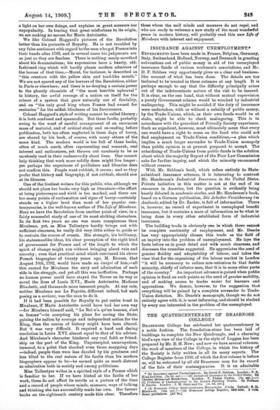INSURANCE AGAINST UNEMPLOYMENT.* EXPERIMENTS have been made in France, Belgium,
Germany, Italy, Switzerland, Holland, Norway, and Denmark in granting subventions out of public money in aid of the unemployed insurance funds of various workmen's associations, and Mr. D. F. Schloss very opportunely gives us a clear and business- like account of what has been done. The details are tod technical to be treated in these columns at any length It is perhaps enough to say that the difficulty principally arises out of the indeterminate nature of the risk to be insured.
It is clear, on the one hand, that without mutual supervision a purely Government scheme would be wrecked by industrial malingering. This might be avoided if the duty of insurance were undertaken, with or without a subsidy of public money, by the Trade-Unions, which, as their own funds would be at stake, might be able to check malingering. This is in accordance with the precedent of Friendly Society experience. Such an expedient, however, must ultimately mean that every one would have a right to come on the fund who could not find employment on Trade-Union conditions,—a plan which implies a much larger surrender to Trade-Union monopoly
than public opinion is at present prepared to accept. The subsidising of Trade-Unions from public funds is the solution about which the majority Report of the Poor Law Commission asks for further inquiry, and which the minority recommend without reserve.
With Mr. Schloss's book, which refers entirely to State- subsidised insurance schemes, it is interesting to contrast Mr. Henderson's Industrial Insurance in. the United States.
Private initiative in this matter is not at the end of its resources in America, but the question is evidently being
keenly debated in academic circles, and Mr. Hendetton's book, based on a German publication, Die Arbeiter-Versichorung iss Auslande, edited by Dr. Zacher, is full of information. There is, however, no record of experiment in unemployed benefit insurance, but it contains a mass of information as to what ii being done in every other established form of industrial insurance.
The building trade is obviously one in whieh there cannel) be complete continuity of employment, and Mr. Deane
has very appropriately chosen this trade as the field of
an inquiry into the problem of unemployment. He lap the facts before us in great detail and with much clearness, and
discusses the remedies suggested. He appreciates the need of greater fluidity and adaptability of labour, and takes the view that for the organising of the labour market in London "it will be necessary to reduce non-unionism to that feeble minority, chiefly of inferior men, that it is in some other parts of the country." An important advance is gained when publio opinion is fixed on such points as the need of greater mobility, and of making access to trades easier for learners and apprentices. We demur, however, to the suggestion that everything will be gained by a complete surrender to Trade- Union dictation. Mr. Dearle's monograph, though we do not entirely agree with it, is most informing, and should be studied by every one interested in the problem of the unemployed.






































 Previous page
Previous page